План урока английского языка 8 класс кузовлев do you always understand what other people say
Обновлено: 05.07.2024
Тема: DO YOU ALWAYS UNDERSTAND ENGLISH – SPEAKIHG PEOPLE?
в устной речи, развивать речевые навыки (asking for explanation), совершенствовать навыки
Развивающая: развивать логическое мышление, память, активность личности, воображение, мышление, восприятие;
Воспитательная: воспитывать уважение к чужой культуре, интерес к изучаемому языку.
Good morning. I am glad to see you. Sit down, please.
Now tell me, please, What date is it today?
What day of the week is it today?
Вводно – мотивационная часть
Today you will learn how to communicate with people if you travel abroad.
Let’s remember some words.
Give me English equivalents:
Заграница, преимущество, замок, предназначение (место назначения), билет, искусство, ремесло (судно), железная дорога, цель, цена, дорогой.
Give me Russian equivalents:
To destroy, to disappear, to discover, to improve, sailing, coin, convenient.
Travelling abroad is not just visiting new places, but also meeting people, learning about theit traditions and customs. What do think you should know before going to Britain?
Abroad, advantage, castle, destination, ticket, art, crafts, railway, aim, cost, expensive,
Разрушать, исчезать, открывать, значить, парус, монета, удобный (подходящий)
I should know English language,
I should also know about some rules of proper behavior,
I should know the traffic regulations.
Перестройка артикуляционного аппарата.
Of course, you should know how to pronounce words correctly and speak without mistakes. But what is more important, you should know how to communicate with the people from other countries.
What do you think “to communicate” means?
When you talk to people in your country, how do you show that you understand what people tell you?
How do you show that you do not understand them?
Sometimes travelers to other countries have problems. Listen to the dialogues. Try to define what problems do these young travelers have?
How do the teenagers show that they do not understand? What questions do they ask?
Don’t be afraid to show that you don’t understand. Always ask people for explanation to avoid troubles. Read the conversation in ex 4 and say what is it that the foreigner did not understand?
What are the ways to show that you do not understand? Read the cultural note.
Read the conversation in ex 5 and say how the foreigners show that they do not understand.
Choose one of the dialogues and play it out.
Now you will get the cards with situations. Make up the dialogues.
It means to talk to another person, to share your thoughts with him| her. It means to express your ideas and to listen to another person.
I nod and smile, if we talk about pleasant
1.the traveler can’t hear clearly
2. The traveler doesn’t understand fast speech.
3. The traveler doesn’t know the meaning of the word.
He didn’t understand what the man told him about his route. He reasked: “Sorry, could you say that again slowly, please”.
Sorry, what bus should I take?
Sorry, what do you mean by “metres”?
Развитие слухового и речевого аппарата
Развитие навыков аудирования,
Активизация лексических единиц
Развитие навыков диалогической речи
H|t is learn your dialogues by heart.
A foreigner asks a passerby how to get to the post office. The foreigner doesn’t understand the fast speech.
A foreigner wants to buy a ticket to Liverpool. The foreigner doesn’t understand the word “return”.
A foreigner asks a policeman how to get to the bus station. The foreigner can’t hear clearly.
A foreigner asks a shop – assistant the travel leaflet costs. The foreigner can’t hear clearly.
A foreigner asks a passerby how to get to the post office. The foreigner doesn’t understand the fast speech.
A foreigner wants to buy a ticket to Liverpool. The foreigner doesn’t understand the word “return”.
A foreigner asks a policeman how to get to the bus station. The foreigner can’t hear clearly.
A foreigner asks a shop – assistant the travel leaflet costs. The foreigner can’t hear clearly.
A foreigner asks a passerby how to get to the post office. The foreigner doesn’t understand the fast speech.
A foreigner wants to buy a ticket to Liverpool. The foreigner doesn’t understand the word “return”.
A foreigner asks a policeman how to get to the bus station. The foreigner can’t hear clearly.
A foreigner asks a shop – assistant the travel leaflet costs. The foreigner can’t hear clearly.
Посмотрите также:
Наверх Бесплатные презентации по различным предметам, 2016—2019
Все права на материалы, находящиеся на сайте, принадлежат их авторам. Все презентации были собраны из открытых источников.

Подтема: Do you always understand what other people say?
Цели урока
предметные результаты (учебный аспект): развитие речевого умения (диалогическая форма речи: диалог этикетного характера), умения выражать в речи функции вежливого переспроса и запроса уточняющей информации: attracting people’s attention, asking for an explanation, asking someone to say something again;
сопутствующая задача: развитие умения аудировать и читать с целью извлечения конкретной информации.
Тема: Do you like travelling?
Подтема: Do you always understand what other people say?
Планируемые результаты (цели урока по аспектам ИК):
личностные результаты (воспитательный и социокультурный аспекты): воспитательный аспект — формирование уверенности в себе и своих силах, чувства собственного достоинства и уважения к достоинству других людей, способности к принятию решений; развитие умения сотрудничать при работе в парах;
социокультурный аспект — знакомство с понятиями и реалиями (single ticket, return ticket, Travelcard, request stop), некоторыми особенностями разговорного этикета; развитие умения вести себя соответственно принятым в странах изучаемого языка нормам;
метапредметные результаты (развивающий аспект):
регулятивные — умение выбирать наиболее эффективные способы решения учебных и познавательных задач, оценивать правильность выполнения учебной задачи, собственные возможности её решения;
познавательные — умение работать с прослушанным текстом, фиксировать нужную информацию, осознанно строить своё высказывание в соответствии с поставленной коммуникативной задачей, а также в соответствии с грамматическими и синтаксическими нормами языка; коммуникативные — умение выражать с достаточной полнотой и точностью свои мысли в соответствии с задачами и условиями межкультурной коммуникации, вступать в диалог, владеть диалогической формой речи, адекватно использовать речевые средства, с помощью вопросов добывать недостающую информацию, устанавливать рабочие отношения, эффективно сотрудничать и способствовать продуктивной кооперации;
предметные результаты (учебный аспект): развитие речевого умения (диалогическая форма речи: диалог этикетного характера), умения выражать в речи функции вежливого переспроса и запроса уточняющей информации: attracting people’s attention, asking for an explanation, asking someone to say something again;
сопутствующая задача: развитие умения аудировать и читать с целью извлечения конкретной информации.
Языковой и речевой материал: продуктивный: лексический — to catch, Pardon?, to repeat; рецептивный: лексический — luggage; речевые функции: asking for an explanation (Sorry. Could you tell me what “…” means?, I’m sorry, what/who/when/where did you say?); asking someone to say something again (I’m sorry, what was that you said?, Sorry, I didn’t catch . Pardon?, Sorry, I didn’t hear …, I’m sorry, what was that (word again)?, I’m sorry, I couldn’t hear what you said. Could you say that slowly, please?, Would you repeat what you said, please?, I’m sorry if I seem a little slow, but …).
Оснащение урока: компьютер, проектор, приложение на электронном носителе, рабочая тетрадь, учебник
Свидетельство и скидка на обучение каждому участнику
Зарегистрироваться 15–17 марта 2022 г.
Выберите документ из архива для просмотра:
Выбранный для просмотра документ Do you always understand what other people say.docx
Do you always understand what other people say?

- Good morning, dear friends!
-Good morning, teacher!
-I am glad to see you!
-We are glad to see you, too!
- Who is on duty today?
- I am on duty today
- What day is it today?
- Today is the 4 th of December
- Who is absent today?
- All are present
- Thank you very much! Sit down, please!
- Today you will learn how to communicate with people if you travel abroad. You will listen to different people and learn how to ask for information.
II Phonetic activity . Фонетическая разминка Слайд 2

III Warming – up activity . Речевая разминка Слайд № 3
Look at the blackboard and answer the questions, please. Посмотрите на доску и ответьте на вопросы .
Do you abroad on holidays?
What is your favourite holiday destination?
Do your parents always discuss with you where to go on holidays?
Do your parents always visit travel agencies?
Do you usually buy a package holiday or travel on your own?
What holiday accommodation do you prefer?
Do you like going on excursions with an organized group?
What is your favourite way of travelling?
IV Lexical activity . Работа с лексическими единицами. Ex. 6 p. 40 AB Слайд 4
1.There are many proverbs about travelling. Find the other half of these English proverbs.

2. Fill in the gaps in the following sentences with an appropriate word from the box. Слайд №5

V Grammar. Ex.2 p.34 AB Слайд №6 -8
While travelling abroad you could come across some signs . Make captions.


VI Listening/Reading for details Работа с текстом диалога . Ex.1 p. 83 Слайд №9
Pre – listening activities. Turn over the page, please. Look at the pictures in ex.1. Travelling abroad is not only visiting tourist attractions. It is also a good chance to meet people. Это также хороший способ познакомиться с людьми . Listen to some conversations where the tourists are. Прослушайте несколько диалогов о туристах.
Find out how they … Выясните как они …
ask to explain the meaning of the word. Просят объяснить значение слова.
ask to say something again. Просят повторить что – нибудь снова.
Post – listening activities.
Answer the questions given before listening.

VII Работа с текстом в разделе “ Cultural note ” Слайд №10

VIII In your culture . Ex.13) p 85 What are some other ways to ask people for an explanation or to say something again? Какие существует другие способы попросить людей объяснить что - нибудь или переспросить ? Make two lists . Составьте два списка.

IX Pair work . Работа в парах. Тренировка навыков говорения ex .2 p .85
Complete the conversations with the appropriate phrases. Дополните диалоги подходящими фразами . Act out the conversations. Разыграйте диалоги .
1) - I’d like to go to Oxford tomorrow morning.
- I asked about the time you would like to go.
-Oh, about 9 o’clock.
2) – Excuse me. Is there a café near here?
- Um… yes, there is…
-Well, go along the street up to the museum. You’ll see a café on the corner opposite the museum.
3) – Good morning. Is this all your luggage?
- Well, you have just this bag, haven’t you?
- Oh, yes, just this suitcase and this bag.
- That’s OK. Here is your boarding card. Go to gate number …
Слайд №12
X Homework . Домашняя работа . Слайд 13
XI The conclusion of the lesson . Подведение итогов урока .
So our time is going up. Did you like the lesson? Вам понравился урок? Why ? Почему? Did you learn something new? Вы узнали что – то новое ? What tasks were difficult or easy for you ? Какие задания были для вас сложными или простыми? Thank you for the lesson. You were active and work very well. Your marks are …The lesson is over. Good-buy!
Выбранный для просмотра документ Do you always understand what other people say.pptx

Описание презентации по отдельным слайдам:

Do you always understand what other people say?

Let’s read the poem HOBBY.

Answer my questions, please! Do you abroad on holidays? What is your favourite holiday destination? Do your parents always discuss with you where to go on holidays? Do your parents always visit travel agencies? Do you usually buy a package holiday or travel on your own? What holiday accommodation do you prefer? Do you like going on excursions with an organized group? What is your favourite way of travelling?

There are many proverbs about travelling. Find the other half of these English proverbs,

Vocabulary. Fill in the gaps in the following sentences with an appropriate word from the box.


Grammar. While travelling abroad you could come across some signs. Make captions.


Travelling abroad is not only visiting tourist attractions. It is also a good chance to meet people. Listen to some conversations where the tourists are.


In your culture. What are some other ways to ask people for an explanation or to say something again? Make two lists.

Pair work. Complete the conversations with the appropriate phrases. Act out the conversations.

Homework Ex.2 AB
Краткое описание документа:
Урок занимает центральное место при изучении юнита “Ты любишь путешествовать? ”. На данном уроке идет развитие фонетических и речевых навыков, развитие произвольного внимания, творческих способностей обучающихся, развитие умения сотрудничать, способности к коммуникабельности; закрепление лексического и грамматического материала по теме. В данном разделе учащиеся увеличивают объем знаний о стране изучаемого языка, расширяют общий кругозор. В течение урока учащиеся развивают самоконтроль, самооценку, работают в различных режимах: в индивидуальном и парном. На данном уроке учащиеся пользуются такими приемами мыслительной деятельности, как сравнение, анализ, синтез. Развивают умения восприятия речи на слух, вести диалог этикетного характера и выражать в речи функции вежливого переспроса и запроса уточняющей информации. Использование ИКТ активизирует мыслительную деятельность на уроке, повышает мотивацию учащихся и прививает интерес к предмету.
Краткое описание: Урок занимает центральное место при изучении юнита “Ты любишь путешествовать? ”. На данном уроке идет развитие фонетических и речевых навыков, развитие произвольного внимания, творческих способностей обучающихся, развитие умения сотрудничать, способности к коммуника
Do you always understand what other people say?

- Good morning, dear friends!
-Good morning, teacher!
-I am glad to see you!
-We are glad to see you, too!
- Who is on duty today?
- I am on duty today
- What day is it today?
- Today is the 4 th of December
- Who is absent today?
- All are present
- Thank you very much! Sit down, please!
- Today you will learn how to communicate with people if you travel abroad. You will listen to different people and learn how to ask for information.
II Phonetic activity. Фонетическая разминка Слайд 2

III Warming - up activity. Речевая разминка Слайд № 3
Do you abroad on holidays?
What is your favourite holiday destination?
Do your parents always discuss with you where to go on holidays?
Do your parents always visit travel agencies?
Do you usually buy a package holiday or travel on your own?
What holiday accommodation do you prefer?
Do you like going on excursions with an organized group?
IV Lexical activity. Работа с лексическими единицами. Ex.6 p.40 AB Слайд 4
1.There are many proverbs about travelling. Find the other half of these English proverbs.
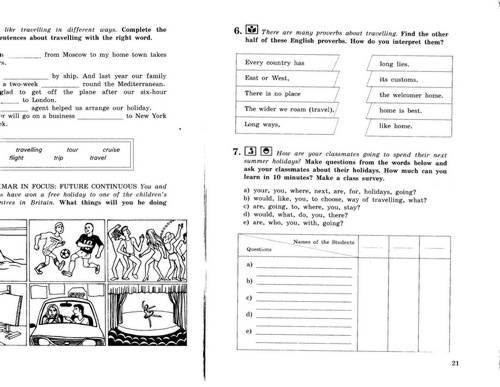
2.Fill in the gaps in the following sentences with an appropriate word from the box. Слайд №5
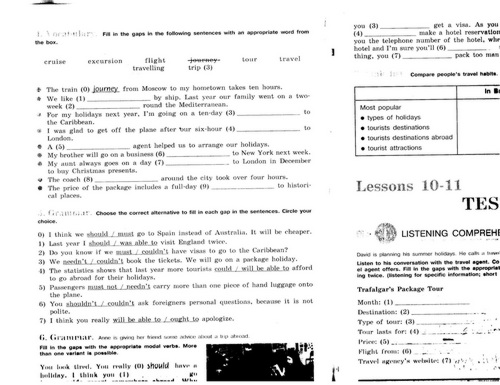
V Grammar. Ex.2 p.34 AB Слайд №6 -8
While travelling abroad you could come across some signs. Make captions.
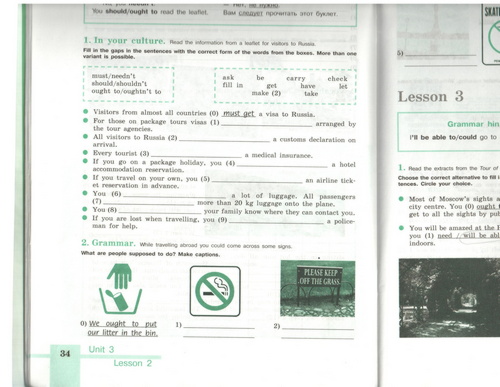
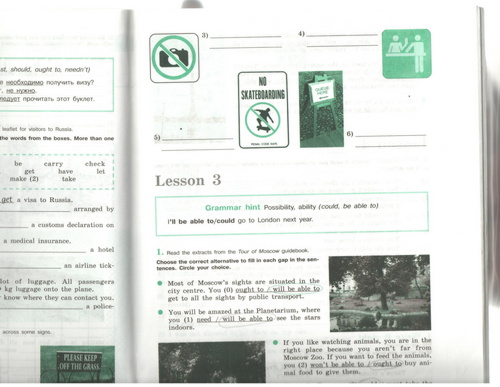
VI Listening/Reading for details Работа с текстом диалога. Ex.1 p. 83 Слайд №9
Pre - listening activities. Turn over the page, please. Look at the pictures in ex.1. Travelling abroad is not only visiting tourist attractions. It is also a good chance to meet people.Это также хороший способ познакомиться с людьми. Listen to some conversations where the tourists are. Прослушайте несколько диалогов о туристах.
ask to explain the meaning of the word. Просят объяснить значение слова.
Answer the questions given before listening.
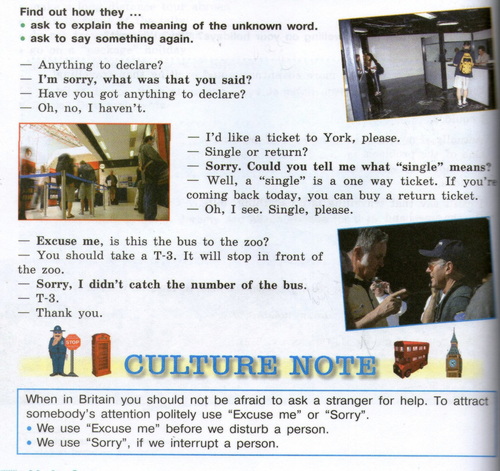
VII Работа с текстом в разделе "Cultural note" Слайд №10
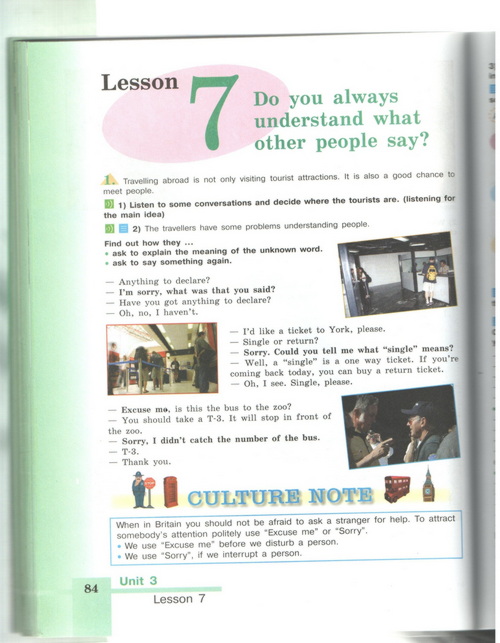
VIII In your culture. Ex.13) p 85 What are some other ways to ask people for an explanation or to say something again?Какие существует другие способы попросить людей объяснить что - нибудь или переспросить? Make two lists. Составьте два списка.
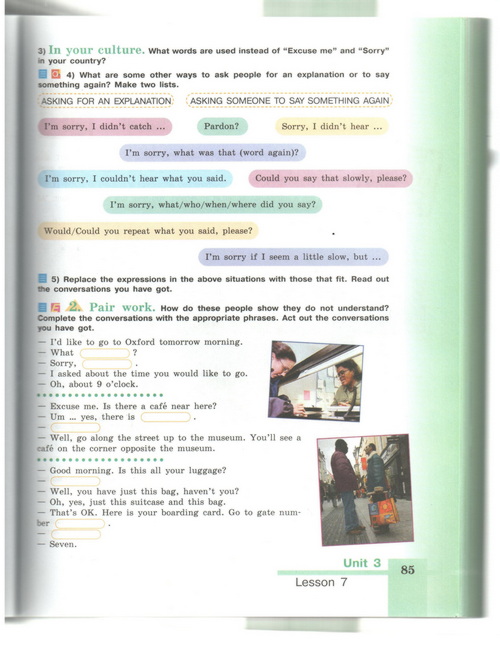
IX Pair work. Работа в парах. Тренировка навыков говорения ex.2 p.85
Complete the conversations with the appropriate phrases.Дополните диалоги подходящими фразами. Act out the conversations. Разыграйте диалоги.
1) - I'd like to go to Oxford tomorrow morning.
- I asked about the time you would like to go.
-Oh, about 9 o'clock.
2) - Excuse me. Is there a café near here?
- Um… yes, there is…
-Well, go along the street up to the museum. You'll see a café on the corner opposite the museum.
3) - Good morning. Is this all your luggage?
- Well, you have just this bag, haven't you?
- Oh, yes, just this suitcase and this bag.
- That's OK. Here is your boarding card. Go to gate number …
X Homework. Домашняя работа. Слайд 13
XI The conclusion of the lesson .Подведение итогов урока.
So our time is going up. Did you like the lesson? Вам понравился урок? Why? Почему? Did you learn something new? Вы узнали что - то новое? What tasks were difficult or easy for you? Какие задания были для вас сложными или простыми? Thank you for the lesson. You were active and work very well. Your marks are …The lesson is over. Good-buy!
Читайте также:

